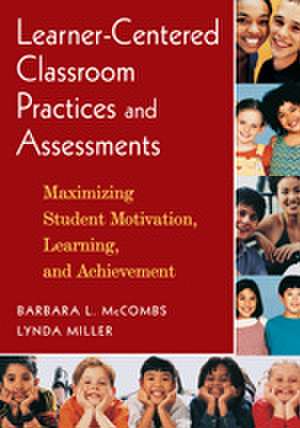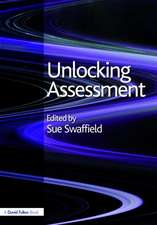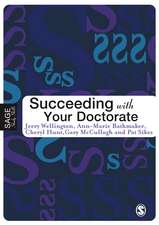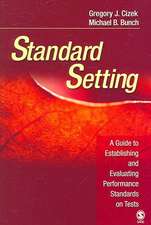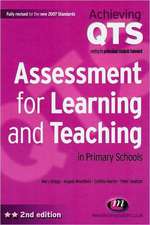Learner-Centered Classroom Practices and Assessments: Maximizing Student Motivation, Learning, and Achievement
Autor Barbara L. McCombs, Lynda Milleren Limba Engleză Paperback – 8 ian 2007
This lively new guide to the learner-centered classroom offers teachers a wide range of strategies for teaching and assessment. Included are interactive training exercises for teachers, self-assessments, reflection tools, a generous collection of illustrations, glossary, research resources, index, and more.
| Toate formatele și edițiile | Preț | Express |
|---|---|---|
| Paperback (1) | 280.49 lei 43-57 zile | |
| SAGE Publications – 8 ian 2007 | 280.49 lei 43-57 zile | |
| Hardback (1) | 519.89 lei 43-57 zile | |
| SAGE Publications – 17 ian 2007 | 519.89 lei 43-57 zile |
Preț: 280.49 lei
Nou
53.67€ • 56.19$ • 44.41£
Carte tipărită la comandă
Livrare economică 07-21 aprilie
Specificații
ISBN-10: 1412926912
Pagini: 200
Dimensiuni: 178 x 254 x 15 mm
Greutate: 0.36 kg
Ediția:1
Editura: SAGE Publications
Colecția Corwin
Locul publicării:Thousand Oaks, United States
Recenzii
"I loved the connections that were made between the suggested practices to improve teaching and real life uses of those practices!"
"This is one of the most well-written books on educational theory that I have read, because it goes to the heart of teaching—the students."
"Well-organized, it practices what it preaches. The authors used varied techniques to build the readers' understanding of learner-centered concepts, techniques, and advocacy. The evidence for learner-based principles and techniques provides credibility to the concepts."
Cuprins
Acknowledgments
About the Authors
1. What We Know About Learning
How Do You Learn Best?
What Does the Evidence Show About Supporting Natural Learning?
Teachers and Students as Co-Learners: An Invitation
What’s Next?
2. What Is Learner Centered From an Evidence-Based Perspective?
What Does “Learner Centered” Mean?
Seeing the Big Picture: Education as a Complex Living System
Domains of Schools as Living Systems
The Learner-Centered Model
What Are the Learner-Centered Principles?
Factors Affecting Learners and Learning
What’s Next?
3. What Teachers and Students Tell Us About Learner-Centered Practices
What Teachers Have Recognized About the LCPs
Translating the LCPs Into Practice
The LCPs, Testing, and Accountability
What Do the LCPs Mean for Teaching and Learning?
What the Evidence Shows: Characteristics of Effective Teachers
What Students Say
Strategies for Honoring Student Voice
Forming a Student Union
Involving Students in Action Research Projects
Students as Meaningful Partners: International Evidence
Reflection
What’s Next?
4. The Learner-Centered Principles: One By One
Domain 1: Cognitive and Metacognitive Factors
LCP 1: Nature of the Learning Process
LCP 2: Goals of the Learning Process
LCP 3: Construction of Knowledge
LCP 4: Strategic Thinking
LCP 5: Thinking About Thinking
LCP 6: Context of Learning
Domain 2: Motivational and Affective Factors
LCP 7: Motivational and Emotional Influences on Learning
LCP 8: Intrinsic Motivation to Learn
LCP 9: Effects of Motivation on Effort
Domain 3: Developmental and Social Factors
LCP 10: Developmental Influence on Learning
LCP 11: Social Influences on Learning
Domain 4: Individual Differences Factors
LCP 12: Individual Differences in Learning
LCP 13: Learning and Diversity
LCP 14: Standards and Assessment
Finding Examples of LCPs in Your Own Practices
What’s Next?
5. Learner-Centered Practices
Turning Principles Into Practices
Glasser’s Six Conditions for Quality Schoolwork
Classroom Climate
Relevance of Learner-Centered Practices in the Context of Standards and Assessment
The Achievement Gap Issue
What Students Say About the Achievement Gap
Reflection
What’s Next?
6. Effective Learner-Centered Practices
Effective Learner-Centered Practices for Students in K–3
Effective Learner-Centered Practices for Students in Grades 4–12
What Happened to “Classroom Management”?
Strategies for Creating Learner-Centered, Resilient Classrooms
Insights and Reflections: What Needs to Change in My Classroom?
What's Next?
7. What Tools Do I Need to Become Learner Centered?
Who’s in Charge of My Learning?
Who’s in Charge of Students’ Learning?
Implications for Practice
Implications for Policy
The Learner-Centered Surveys
Characteristics of Learner-Centered Tools
The Assessment of Learner-Centered Practices (ALCP):Tools for Creating Learner-Centered Classrooms and Departments
Research-Validated Definition of “Learner Centered”
ALCP Feedback Process for Teachers
Understanding Sample ALCP Feedback: Table of Teacher Variables Compared to the Learner-Centered Rubric for One Teacher
Becoming a Magnet for Change in My School and District
Reassessing My Beliefs
What Is My Vision for Schools?
My Plan for a Learner-Centered Classroom
How Can I Manage Resistance to Change?
Obtaining the Necessary Support for Learner-Centered Schools
Where Do I Go From Here?
Resource A: Teacher Strategy Ideas
Resource B: Contacts: Learner-Centered Projects and Schools
Resource C: Books and Journals Worth a Read
Resource D:Learner-Centered Glossary: Some Definitions
References
Index
Notă biografică
Barbara L. McCombs directs the Human Motivation, Learning, and Development Center at the University of Denver. The center focuses on the professional development of educators, personal and organizational change, systemic educational reform, and school violence prevention.
McCombs¿ current research is directed at new leadership models for redesigning outdated views of schooling and learning. This research has led to her international and national recognition in areas that include transformational teacher development approaches, motivating hard-to-reach students, and the use of technology as a primary tool for empowering youth and facilitating relevant learning.
The author has begun a series of books published by Corwin Press. Learner-Centered Classroom Practices and Assessments: Maximizing Student Motivation, Learning, and Achievement (2006) was co-authored with Lynda Miller and written for teachers. Her second book in the series, written for school administrators and other school leaders, was also co-authored with Lynda Miller and is titled A School Leader¿s Guide to Creating Learner-Centered Education: From Complexity to Simplicity (2008).
McCombs is the primary author of Learner-Centered Psychological Principles (LCPs): Guidelines for School Redesign and Reform. She has developed research-validated learner-centered models of teaching and learning based on the LCPs.
Through collaborations with colleagues at the University of Bristol in England, she developed an online version of her Assessment of Learner-Centered Practices (ALCP) teacher and student surveys. These surveys have been validated with over 35,000 students and their teachers in Grades K-3, 4-8, 9-12, and college level. The ALCP surveys are being used in numerous national and international K-12 schools as well as colleges.
